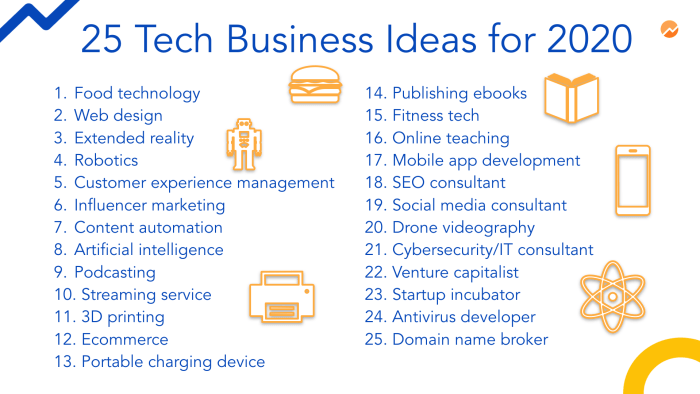Online Business Ideas bring a world of opportunities for budding entrepreneurs looking to make their mark in the digital landscape. From innovative monetization strategies to effective digital marketing techniques, this guide dives deep into the realm of online businesses, offering insights and inspiration for success.
Types of Online Business Ideas
Starting an online business can be an exciting venture with endless possibilities. There are various categories of online business ideas that entrepreneurs can explore. Let’s dive into some of these different types and their characteristics.
E-commerce
E-commerce businesses involve selling products or services online. These businesses can range from small independent shops to large online retailers. Characteristics of e-commerce businesses include the need for a user-friendly website, secure payment gateways, and effective marketing strategies. Examples of successful e-commerce businesses include Amazon, eBay, and Etsy.
Freelancing
Freelancing businesses are based on offering services to clients on a project basis. Freelancers work independently and can provide a wide range of services such as writing, graphic design, web development, and marketing. The key characteristics of freelancing businesses include building a strong portfolio, networking with potential clients, and delivering high-quality work. Popular platforms for freelancers include Upwork, Fiverr, and Freelancer.
Dropshipping
Dropshipping businesses involve selling products to customers without holding any inventory. Instead, the products are shipped directly from the supplier to the customer. Characteristics of dropshipping businesses include low startup costs, minimal risk, and the ability to test products without investing in inventory. Successful dropshipping businesses include Oberlo, Printful, and AliExpress.
Affiliate Marketing
Affiliate marketing businesses focus on promoting other companies’ products and earning a commission for each sale made through their referral. Characteristics of affiliate marketing businesses include the need for a strong online presence, strategic marketing tactics, and building relationships with affiliate programs. Examples of successful affiliate marketing businesses include Amazon Associates, ClickBank, and ShareASale.
Research and Planning

Market research is crucial for any online business as it helps in understanding the target audience, competitors, and industry trends. It provides valuable insights that can guide decision-making and strategy development.
Importance of Market Research
Market research allows businesses to identify the needs and preferences of their target audience, helping them tailor their products or services accordingly. It also helps in assessing the competition and determining the best ways to differentiate the business in the market.
- Conduct surveys, interviews, and focus groups to gather data directly from potential customers.
- Analyze industry reports, trends, and statistics to understand the market landscape.
- Utilize online tools like Google Analytics, social media insights, and research to gather relevant data.
Identifying Target Audiences
Understanding the target audience is essential for effective marketing and product development. Businesses can identify their target audience by creating buyer personas based on demographic, psychographic, and behavioral factors.
- Segment the market based on age, gender, location, income, interests, and buying behavior.
- Use data analytics to track customer behavior on the website and social media platforms.
- Conduct A/B testing to determine the most effective marketing strategies for different audience segments.
Developing a Solid Business Plan
A well-thought-out business plan serves as a roadmap for the business, outlining its goals, strategies, and financial projections. It helps in securing funding, attracting investors, and staying focused on key objectives.
- Define the business objectives, target market, competitive landscape, and unique selling proposition.
- Create a detailed marketing plan, including strategies for customer acquisition, retention, and engagement.
- Develop a financial plan with revenue projections, expenses, and break-even analysis.
Monetization Strategies
In the world of online business, monetization strategies play a crucial role in determining the success and sustainability of a venture. Let’s explore various methods used by online businesses to generate income and the pros and cons associated with each revenue stream.
1. Advertising
Advertising is one of the most common monetization methods used by online businesses. This involves displaying ads on a website or platform in exchange for payment from advertisers. The pros of advertising include a potentially high revenue stream, especially for websites with high traffic. However, the cons include the need to balance user experience with ad placement to avoid turning off visitors.
2. Affiliate Marketing
Affiliate marketing involves promoting products or services from other companies and earning a commission for each sale or lead generated through your referral. The pros of affiliate marketing include the opportunity to earn passive income and the ability to leverage existing relationships. On the downside, competition can be fierce, and success may require a significant amount of time and effort.
3. Subscription Services
Subscription services involve charging users a recurring fee for access to premium content, products, or services. The pros of subscription services include a predictable revenue stream and the potential for steady growth. However, the cons include the need to continuously provide value to retain subscribers and the risk of churn if users are not satisfied.
4. E-commerce, Online Business Ideas
E-commerce involves selling products or services online through a dedicated platform or marketplace. The pros of e-commerce include the ability to reach a global audience and the potential for high-profit margins. However, the cons include the need to manage inventory, shipping, and customer service effectively.
5. Sponsored Content
Sponsored content involves partnering with brands to create and promote content that aligns with their products or services. The pros of sponsored content include the potential for high earnings and the opportunity to reach new audiences. On the downside, maintaining authenticity and transparency is crucial to avoid losing credibility with your audience.
6. Online Courses and Digital Products
Creating and selling online courses, e-books, software, or other digital products is another popular monetization strategy. The pros include the ability to leverage your expertise and generate passive income. However, the cons include the need to continuously update and promote your products to stay relevant in a competitive market.Innovative ways to generate income online include exploring niche markets, leveraging social media influencers, implementing a freemium model, or offering personalized services.
By diversifying your monetization strategies and staying adaptable to market trends, you can maximize your earnings potential in the online business world.
Digital Marketing Techniques

In today’s digital landscape, effective marketing strategies are crucial for the success of online businesses. Utilizing various digital marketing techniques can help businesses reach a wider audience, increase brand visibility, and drive sales. Let’s explore some key strategies that can elevate your online venture.
(Search Engine Optimization)
plays a vital role in driving organic traffic to your website. By optimizing your site’s content and structure, you can improve your search engine rankings and attract more visitors. Here are some tips for effective :
- Research relevant s and integrate them naturally into your content.
- Create high-quality, engaging content that provides value to your audience.
- Optimize your website’s meta tags, headings, and images for search engines.
- Build high-quality backlinks from reputable websites to improve your site’s authority.
Social Media Marketing
Social media platforms offer a powerful way to connect with your target audience and build brand awareness. Here are some strategies for effective social media marketing:
- Identify the platforms where your target audience is most active and focus your efforts there.
- Create a content calendar to plan and schedule posts in advance.
- Engage with your followers by responding to comments and messages in a timely manner.
- Run targeted advertising campaigns to reach specific demographics and drive conversions.
Email Marketing
Email marketing remains a valuable tool for nurturing leads and converting prospects into customers. Here are some tips for creating engaging email campaigns:
- Personalize your emails to make them more relevant to individual recipients.
- Segment your email list to send targeted messages based on customer preferences and behaviors.
- Use compelling subject lines and clear calls-to-action to improve open and click-through rates.
- Monitor and analyze key metrics like open rates, click-through rates, and conversion rates to optimize your campaigns.